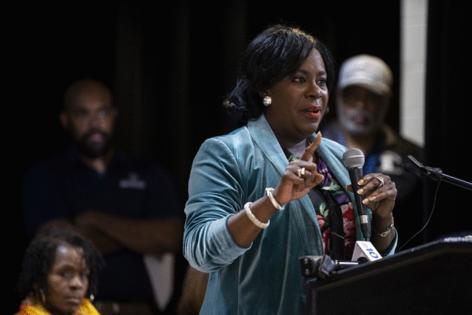Philadelphia Mayor Parker's administration says it is ready 'to litigate' if city's funding is put at risk under Trump sanctuary order
Published in News & Features
PHILADELPHIA — An official from Mayor Cherelle L. Parker’s administration said Tuesday that they are prepared to go to court if federal authorities identify Philadelphia as a so-called “sanctuary city” and decide to revoke its federal funding under a new executive order signed by President Donald Trump.
City Solicitor Renee Garcia on Tuesday offered City Council the Parker administration’s most articulated position thus far on the president’s April 28 executive order that will create a list of “sanctuary jurisdictions” the Trump administration believes subvert federal immigration law. The metrics for how officials are determining impacted jurisdictions remain unknown, and it is unclear whether Philadelphia will be targeted.
According to the order, the listed jurisdictions will be notified of their status and, if they maintain their sanctuary policy, could face federal funding cuts or legal action.
“If we have to litigate, then we’ll do that,” Garcia said during the Council budget hearing with city legal department officials. She expects other national lawsuits to unfold once the list is published.
Philadelphia received $2.2 billion in federal funding in the 2024 fiscal year, with the majority of funds going towards health and social services programs.
Garcia said the law will be on the city’s side if Philadelphia is targeted, noting that the city litigated a similar issue during Trump’s first term and a judge ruled that the president cannot revoke Philadelphia‘s funding for its sanctuary policies. District Attorney Larry Krasner and Chief Defender Keisha Hudson, who also testified during the Council budget hearing Tuesday, signaled a willingness to protect Philadelphia’s immigrant communities from any potential illegal activity that could result from Trump’s identification of sanctuary cities.
Krasner, who has become one of the Trump administration’s most vocal opponents on the local level and is campaigning for a third term in office on that platform, said he would not comment on the Parker administration’s approach to defending these potential attacks from Trump, but promised he would be up to the task if federal authorities break the law.
“He breaks laws in Philly, he’s gonna find out.”
Attorney General Pam Bondi is expected to issue letters to sanctuary jurisdictions within the month, according to Trump’s executive order. Garcia argued Tuesday that she rejects the term “sanctuary” to describe the city, saying that it inaccurately labels Philadelphia as a city “illegally harboring migrants or undocumented people.” Some city officials have opted to use the term “welcoming city” in recent months.
Philadelphia is considered one of the strongest so-called sanctuary cities, for various reasons including the city’s policy to not comply with ICE detainer requests, only judicial warrants, Garcia said Tuesday. This policy is supported by a 2016 executive order from former Mayor Jim Kenney.
“We are backed up by Third Circuit case law in that respect,” she said of the city’s noncompliance with ICE detainers. “So we believe that we are following the law. We know that we are following the law.”
During the hearing Tuesday, the city’s definition of detainment briefly came into question when discussing an incident that occurred last month at Philadelphia’s criminal courthouse when a Philadelphia police officer escorted a Dominican man, who just had criminal charges against him dismissed, into the custody of federal immigration authorities.
Garcia and Hudson had conflicting perceptions of the incident, with the solicitor saying Tuesday that the man was not detained by police and instead “walked down” while police offered translation services.
Hudson pushed back and said the man was told by the sheriff’s deputies that ICE was waiting for him and was then escorted out of court by a police officer who provided translation services. The man’s public defender, who had other matters before the court, did not go with him and therefore did not see a warrant.
“We are all lawyers up here. That was a detention,” Hudson said.
Hudson said the association is telling its clients “to be prepared at any time” for possible detentions.
If Philadelphia is targeted by the Trump administration, Garcia said the city will have time to respond, and expects Parker “will have many conversations and follow her diplomatic procedure as she does.”
The mayor has pivoted away from offering plentiful responses when asked about threats to Philadelphia‘s status. When Trump signed the executive order last month, Parker reaffirmed the city’s compliance with Kenney’s 2016 order, then switched gears to say she was focused on her own agenda.
“The legal road is long, but the courts have really been stepping up to protect the rule of law,” Garcia added.
©2025 The Philadelphia Inquirer, LLC. Visit at inquirer.com. Distributed by Tribune Content Agency, LLC.







Comments